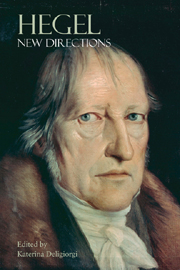Book contents
- Frontmatter
- Contents
- Contributors
- Acknowledgements
- Abbreviations
- Introduction: On reading Hegel today
- 1 Hegel on conscience and the history of moral philosophy
- 2 The apperceptive I and the empirical self: towards a heterodox reading of “Lordship and Bondage” in Hegel's Phenomenology
- 3 Hegel, McDowell and recent defences of Kant
- 4 Substance, subject and infinity: a case study of the role of logic in Hegel's system
- 5 Dialectic as logic of transformative processes
- 6 Hegel, ethics and the logic of universality
- 7 Recognition and reconciliation: actualized agency in Hegel's Jena Phenomenology
- 8 The contemporary relevance of Hegel's practical philosophy
- 9 Catching up with history: Hegel and abstract painting
- 10 New directions in Hegel's philosophy of nature
- 11 Hegel and the gospel according to Immanuel
- 12 What is conceptual history?
- 13 On Hegel's interpretation of Aristotle's psyche: a qualified defence
- Bibliography
- Index
12 - What is conceptual history?
- Frontmatter
- Contents
- Contributors
- Acknowledgements
- Abbreviations
- Introduction: On reading Hegel today
- 1 Hegel on conscience and the history of moral philosophy
- 2 The apperceptive I and the empirical self: towards a heterodox reading of “Lordship and Bondage” in Hegel's Phenomenology
- 3 Hegel, McDowell and recent defences of Kant
- 4 Substance, subject and infinity: a case study of the role of logic in Hegel's system
- 5 Dialectic as logic of transformative processes
- 6 Hegel, ethics and the logic of universality
- 7 Recognition and reconciliation: actualized agency in Hegel's Jena Phenomenology
- 8 The contemporary relevance of Hegel's practical philosophy
- 9 Catching up with history: Hegel and abstract painting
- 10 New directions in Hegel's philosophy of nature
- 11 Hegel and the gospel according to Immanuel
- 12 What is conceptual history?
- 13 On Hegel's interpretation of Aristotle's psyche: a qualified defence
- Bibliography
- Index
Summary
PHILOSOPHY AND HISTORY
In the final lines of the Phenomenology, Hegel makes the complex claim that the contingency of history and the science of knowing in the sphere of appearance together constitute a “conceptual history” (begriffene Geschichte): a “conceptually comprehended” history (PhG: 493; W 3: 591). What is this suggestive but frustratingly obscure formula meant to convey? The question is vexing, not least because the Phenomenology itself is neither a philosophy of history nor a philosophical history in any traditional sense; it rather takes the form of a quasi-historical narrative that picks up on the difficult problem of philosophy's relation to history. For this reason, the attempt to understand what Hegel means by the term may be helped along by a critical analysis of selected aspects of his philosophy of history. The limits of the question therefore go beyond the specific project of the Phenomenology, although answering the question will involve returning to one of the central themes of that book, namely, the concept of experience (Erfahrung). In any event, the aim here is not so much to evaluate Hegel's theory of world history as it is to gain a better understanding of how in general he understands historical knowledge in relation to philosophical knowledge of the absolute, a central concern throughout his career.
- Type
- Chapter
- Information
- HegelNew Directions, pp. 207 - 226Publisher: Acumen PublishingPrint publication year: 2006
- 2
- Cited by

